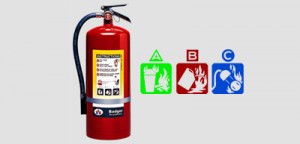
Multi-Purpose Extinguisher
Having fire extinguishers installed in your home should be part of your overall fire safety plan and selecting a fire extinguisher for your home might seem elementary. However, knowing which type of extinguisher to use depends on the type of fire and may seem more like rocket science. Here are the facts you need to know.
- Know your fire types. Using an extinguisher not rated for a particular type of fire could have disastrous results. Here’s the short list:
- A: common combustibles such as wood, papers, textiles, plastic, etc.
- B: flammable liquids such as gasoline, kerosene, methanol to name just a few.
- C: electrical equipment such as switches, outlets, etc.
- Select a multi-purpose extinguisher designed to handle the most common A, B, and C types of home fires. The extinguisher should be large enough to put out a small fire, but not so heavy that it’s difficult to handle.
- Become familiar with the extinguisher before you need it in a real fire situation by reading the instructions and familiarizing yourself with the various parts and how they operate. Most local fire departments offer free hands-on training.
- Make sure that your extinguisher is properly maintained. Again, refer to the instructions and check your local business listings for companies that service fire extinguishers.
- Use the fire extinguisher when the fire is confined to a small area, such as a wastebasket, and is not growing. First, make sure everyone has left the home and the fire department has been called. Home fires can quickly get out of control so let the professionals handle the situation and ensure your personal safety.
For additional information regarding fire safety equipment such as smoke alarms, refer to our New 2015 Smoke Detectors Law in Florida and any of our other fire prevention articles in the Home Maintenance section of our blog for more information.
Buy Your Side Home Inspections wants you and your family to be safe in your home. When you need a professional home inspection, give us a call. We’re here for you. 407.780.0911.
Read More
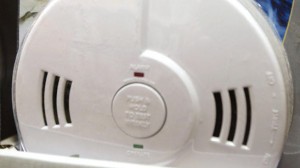
New Code for Smoke Alarms in Florida
Statistics report that 94 percent of American households have smoke detectors, but 30 percent of those alarms don’t work. Additionally, most fire fatalities happen in homes that lack working alarms. Between January 1st and December 1, 2014, there were 114 deaths due to residential fire reported in Florida. Of those reported deaths, 43 percent of the homes either did not have smoke alarms installed or the smoke alarms were not functioning because of missing or disconnected batteries.
Beginning January 1, 2015, the Florida Building Code now requires Florida homeowners that do not have hard-wired smoke detectors to install 10-year sealed battery smoke alarms. A hard-wired smoke detector is wired to 120V household electrical circuit and connected to other detectors throughout your home. Hard-wired smoke and carbon monoxide alarms sound simultaneously, on all levels of your home, when a single unit detects smoke or gas. Units with battery backup provide extra protection by functioning even if a fire causes the power to go out. Smoke alarm manufacturers recommend alarms be replaced every 10 years.
The new code only requires homeowners to make the switch when replacing outdated or non-working alarms or installing new 10-year sealed battery smoke alarms. The date your alarm was manufactured can be found on the back of the device. These smoke detectors have a longer life lithium batteries inside and are tamper resistant and removes the consumers’ worry about remembering when to change batteries.
The 10-year sealed battery smoke alarms are available online and at most hardware stores averaging between $25 and $50. The savings in battery costs alone as well as saving lives more than justifies the cost.
Buy Your Side Home Inspections wants you and your family to be safe in your home. When you need a professional home inspection, give us a call. We’re here for you. 407.780.0911.
Read More
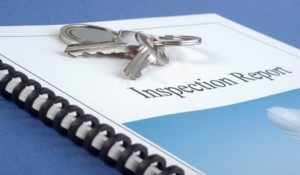
Inspection Report Buyer Benefits
You’re considering the purchase of a property and have hired a professional Home Inspector to inspect the property’s condition. As the buyer, there are five different benefits of the inspection report which you can use to:
- Determine your ability to financially afford and maintain the home based on the property’s condition and potential repairs and replacements needed in the near future.
- Negotiate pre-purchase repairs or a reduction in the property’s purchase price.
- List the actionable to-do items necessary to maintain the property after purchase.
- Provide details to contractors when obtaining estimates for repair or replacements.
- Justify your decision not to purchase the property based on certain types of undisclosed defects.
Buy Your Side Home Inspections – experience you can count on. We have been inspecting homes and businesses in Central Florida, and specifically Osceola County, for many years. When you need an inspection, call Buy Your Side 407.780.0911.
Read More
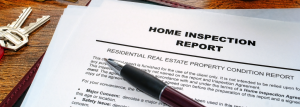
Home Inspection Seller Benefits
Your home is on the market or you’re thinking about selling in the near future. As the seller, there are four benefits of obtaining an inspection. You can use the report to:
- Identify and correct significant issues ahead of time that could interfere with a buyer’s desire to purchase the property.
- Disclose the pre-sale condition of the property with known defects or required repairs justifying the property’s asking price.
- Provide details to contractors when obtaining estimates for repair or replacements.
- Foster confidence with potential buyers to move ahead with an offer knowing that significant issues have been identified and addressed.
Buy Your Side Home Inspections – experience you can count on. We have been inspecting homes and businesses in Central Florida, and specifically Osceola County, for many years. When you need an inspection, call Buy Your Side 407.780.0911.
Read More
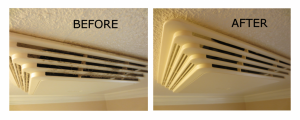
Bathroom Exhaust Fan Before / After
Does your bathroom deep cleaning routine include your ventilation fan? If not, it should. When used and maintained properly, your ventilation fan helps reduce mold and mildew. When it’s neglected, it can host all kinds of airborne particles that can accumulate on the blades and the vent. Follow these six simple steps to keep your bathroom fan functioning properly.
- Flip the circuit breaker for the room.
- Remove the vent cover and soak it in warm water and dish soap.
- Vacuum the fan blades to remove any dust and particles.
- Wipe the blades with a damp cloth.
- Remove dust from the motor and around the motor with a stiff, clean paintbrush and vacuum up any debris.
- Replace the cover when it’s completely dry.
It’s important to run your ventilation fan during every shower and for 30 minutes afterward to reduce moisture in your bathroom and the potential build up of mold and mildew.
If you suspect mold may be an issue in your home or when you need a home inspection, call the Florida Inspector from Buy Your Side Home Inspections. 407.780.0911.
Read More
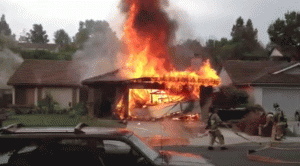
Is Your Garage Free of Fire Hazards?
Most homes built today have attached garages intended primarily for the shelter of automotive vehicles. However, their use has expanded over years to not only include vehicle storage but an extra space used for storing household items, repairing vehicles and as the ultimate “man cave.” Fires in garages are not just dangerous because of their contents but also because of its location in relation to the home. You can reduce the threat of garage fires by addressing eight of these common hazards:
- Propane tanks, under the right conditions, can explode. Propane tanks are sturdy and should be stored outside on a flat surface away from flammable liquids and spark-producing machines.
- Power tools plugged in while not in use can cause sparking from overloaded electrical outlets. Power tools should be unplugged when not in use, and outlets should be up to code and properly grounded with breakers.
- Improperly stored cleaning products and flammable chemical liquids such as paint, oil, gasoline, brake fluid, varnish, paint thinner and lighter fluid can be highly combustible when exposed to a spark. Store your flammable liquids in clearly labeled, self-closing containers and only in small amounts away from direct sunlight, heaters, spark-producing machines and appliances.
- Pesticides, garden fertilizers and lawn care materials can become combustible especially as they age if exposed to direct sunlight for extended periods.
- Fuel and oil leaks from vehicles, motorcycles and gas powered machines such as lawnmowers could spark fires very quickly. Cars and tools should be stored with care and floors kept free of oil and gasoline.
- Lightbulbs that exceed recommended wattage can spark a fire. Do not exceed the limit.
- Non-functioning smoke detector and no fire extinguisher in the garage.
- Cluttered garages with loose papers, oily rags, discarded household items and boxes are extremely dangerous. Install shelving units for items you wish to keep, simply throw things away or have a “Garage Sale!”
Buy Your Side Home Inspections wants you and your family to be safe in your home. If you’re unsure if your garage walls, ceiling and interior doors are fire-rated, give us a call. We’re here for you. 407.780.0911.
Read More

“Chestnuts Roasting On An Open Fire”
Before you roast those chestnuts in your fireplace, chimney maintenance should be a top priority for safety in your home every year.
Don’t skip the chimney sweep and fireplace maintenance. A chimney sweep uses large, stiff brushes and other tools to dislodge creosote and soot from the interior of the chimney which build up with each use of your fireplace.
Depending on how frequently you use your fireplace, as a rule, experts say if you use your fireplace regularly (averaging twice a week through the cold months), you should have your chimney cleaned at least once every two years by a qualified and trained professional. The Chimney Safety Institute of America at http://www.csia.org is the go-to authority for finding a qualified sweep. Simply use their easy search feature.
And, when you need a home inspection, call Buy Your Side Home Inspections. We have been inspecting homes and businesses in Central Florida, and specifically Osceola County, for many years. 407.780.0911.
Read More
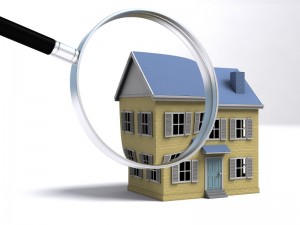
New Home Inspection
Many buyers make the mistake of not getting a newly-constructed home inspected wondering why an inspection would be necessary on a brand new house. If you’re a new home buyer, don’t assume your builder did everything properly just because the home passed code. Sometimes shortcuts are taken to save time and money which can cost you money in the long run. Follow these four steps to safeguard your investment:
- Have new construction inspected. A home inspector will look deeper into the home looking at different things than the local building inspector will.
- Choose an inspector for the right reasons. Get referrals and check credentials.
- Go along on the inspection and ask questions.
- Follow up on the inspector’s recommendations.
Have your newly constructed home inspected by Central Florida’s most-respected Home Inspector – Buy Your Side Home Inspections before you sign on the dotted line. 407.780.0911
Read More









Follow Us!